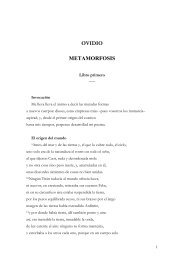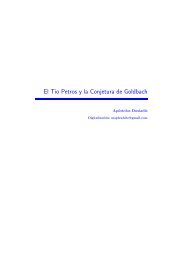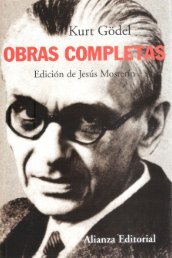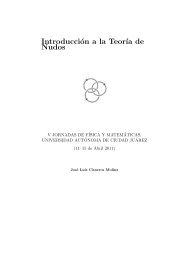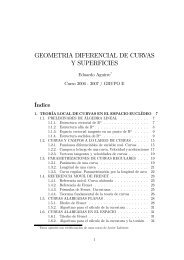Tao_T.-Analysis_I_(Volume_1)__-Hindustan_Book_Agency(2006)
Tao_T.-Analysis_I_(Volume_1)__-Hindustan_Book_Agency(2006)
Tao_T.-Analysis_I_(Volume_1)__-Hindustan_Book_Agency(2006)
You also want an ePaper? Increase the reach of your titles
YUMPU automatically turns print PDFs into web optimized ePapers that Google loves.
26 2. The natural numbers<br />
understood abstractly via axioms, without necessarily needing a<br />
concrete model; of course a mathematician can use any of these<br />
models when it is convenient, to aid his or her intuition and understanding,<br />
but they can also be just as easily discarded when<br />
they begin to get in the way.<br />
One consequence of the axioms is that we can now define se<br />
quences recursively. Suppose we want to build a sequence ao, a1,<br />
a2, ... of numbers by first defining ao to be some base value, e.g.,<br />
ao := c for some number c, and then by letting a1 be some func<br />
tion of ao, a1 := /o(ao), a2 be some function of a1, a2 := fi(a1-),<br />
and so forth. In general, we set an++ := fn(an) for some func<br />
tion f n from N to N. By using all the axioms together we will<br />
now conclude that this procedure will give a single value to the<br />
sequence element an for each natural number n. More precisely3 :<br />
Proposition 2.1.16 (Recursive definitions). Suppose for each<br />
natural number n, we have some function fn : N ---... N from<br />
the natural numbers to the natural numbers. Let c be a natural<br />
number. Then we can assign a unique natural number an to each<br />
natural number n, such that ao = c and an++ = fn(an) for each<br />
natural number n.<br />
Proof. (Informal) We use induction. We first observe that this<br />
procedure gives a single value to ao, namely c. (None of the other<br />
definitions an++ := fn(an) will redefine the value of ao, because<br />
of Axiom 2.3.) Now suppose inductively that the procedure gives<br />
a single value to an. Then it gives a single value to an++, namely<br />
an++ := fn(an). (Nolle of the other definitions llm++ := fm(am)<br />
will redefine the value of an++, because of Axiom 2.4.) This completes<br />
the induction, and so an is defined for each natural number<br />
n, with a single value assigned to each an. D<br />
3 Strictly speaking, this proposition requires one to define the notion of<br />
a function, which we shall do in the next chapter. However, this will not<br />
be circular, as the concept of a function does n_ot require the Peano axioms.<br />
Proposition 2.1.16 can be formalized more rigourously in the language of set<br />
theory; see Exercise 3.5.12.



